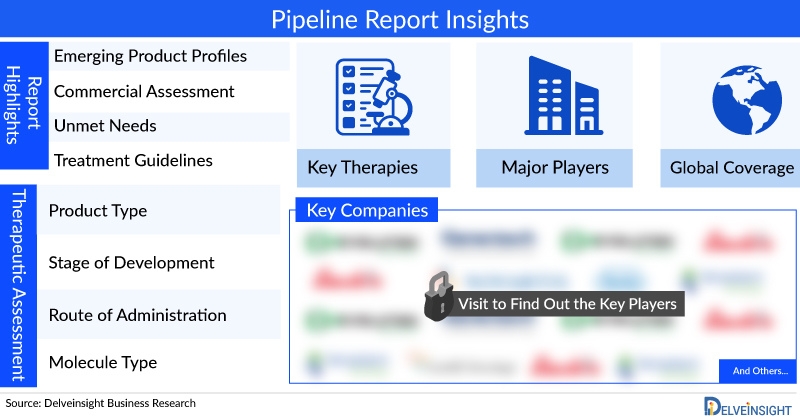DelveInsight’s “Familial Lipoprotein Lipase Deficiency – Pipeline Insight, 2025” profiles an emerging portfolio of targeted therapies, with gene therapy platforms aiming to restore functional LPL enzyme activity through adeno-associated viral (AAV) vectors, building on earlier proof-of-concept success. Recombinant LPL protein formulations and small molecules designed to enhance residual enzyme activity or modulate lipid metabolism pathways, including ANGPTL3 and APOC3 inhibition, are gaining traction in preclinical and early clinical stages. In parallel, precision lipid-lowering agents are being investigated for their potential to reduce triglyceride-rich lipoproteins without the limitations of dietary-only strategies.
The 2025 pipeline reflects a shift from symptomatic management toward durable, genetic-level correction, supported by growing regulatory interest in rare metabolic diseases and orphan drug development incentives. With gene therapies, biologics, and next-generation lipid modulators advancing through the pipeline, the coming years could redefine the therapeutic landscape for LPLD—offering patients the possibility of long-term metabolic stability and reduced pancreatitis risk.
Interested in learning more about the current treatment landscape and the key drivers shaping the familial lipoprotein lipase deficiency pipeline? Click here
Key Takeaways from the Familial Lipoprotein Lipase Deficiency Pipeline Report
• DelveInsight’s familial lipoprotein lipase deficiency pipeline analysis depicts a strong space with 5+ active players working to develop 5+ pipeline drugs for familial lipoprotein lipase deficiency treatment.
• The leading familial lipoprotein lipase deficiency companies include Ionis Pharmaceuticals, Inc., Arrowhead Pharmaceuticals, and others are evaluating their lead assets to improve the familial lipoprotein lipase deficiency treatment landscape.
• Key familial lipoprotein lipase deficiency pipeline therapies in various stages of development include Olezarsen, ARO-APOC3, and others.
• In July 2025, the EMA’s CHMP recommended EU approval of Tryngolza (olezarsen) for FCS, supported by Phase 3 data.
• In January 2025, Arrowhead announced the FDA accepted its NDA for plozasiran for FCS and set a PDUFA date of November 18, 2025, following positive Phase 3 PALISADE results including reductions in triglycerides and acute pancreatitis risk.
• In December 2024, the FDA approved olezarsen (Tryngolza) as the first therapy for adults with FCS to reduce triglycerides, addressing a condition frequently caused by bi-allelic LPL mutations.
Familial Lipoprotein Lipase Deficiency Overview
Familial Lipoprotein Lipase Deficiency (LPLD) is a rare inherited genetic disorder characterized by a deficiency or malfunction of the enzyme lipoprotein lipase (LPL). This enzyme is essential for breaking down triglycerides in the blood, allowing the body to use or store fats properly. Due to the lack of functional LPL, individuals with LPLD experience extremely high levels of triglycerides, leading to symptoms such as recurrent episodes of pancreatitis, abdominal pain, eruptive xanthomas (fatty skin deposits), and an increased risk of other complications like hepatosplenomegaly (enlarged liver and spleen).
LPLD typically manifests in childhood or adolescence and is inherited in an autosomal recessive pattern, meaning both copies of the gene must be mutated for the disorder to occur. Management of the disease primarily focuses on strict dietary fat restriction to reduce triglyceride levels and prevent pancreatitis episodes. Emerging treatments, including gene therapy and novel pharmacological approaches, are being researched to provide better outcomes for patients with this condition.
Find out more about familial lipoprotein lipase deficiency medication at https://www.delveinsight.com/report-store/familial-lipoprotein-lipase-deficiency-pipeline-insight
Familial Lipoprotein Lipase Deficiency Treatment Analysis: Drug Profile
Olezarsen: Ionis Pharmaceuticals, Inc.
Olezarsen, developed by Ionis Pharmaceuticals, Inc., is an investigational ligand-conjugated antisense (LICA) therapy aimed at reducing the production of apoC-III, a liver-produced protein that regulates triglyceride metabolism in the blood. Elevated levels of apoC-III contribute to high triglycerides, putting patients—such as those with familial chylomicronemia syndrome (FCS)—at increased risk of acute pancreatitis and cardiovascular disease (CVD). Olezarsen is currently in Phase III clinical trials for the treatment of familial lipoprotein lipase deficiency.
Learn more about the novel and emerging familial lipoprotein lipase deficiency pipeline therapies.
Familial Lipoprotein Lipase Deficiency Therapeutics Assessment
By Product Type
• Mono
• Combination
• Mono/Combination.
By Stage
• Late-stage products (Phase III)
• Mid-stage products (Phase II)
• Early-stage product (Phase I) along with the details of
• Pre-clinical and Discovery stage candidates
• Discontinued & Inactive candidates
By Route of Administration
• Intra-articular
• Intraocular
• Intrathecal
• Intravenous
• Ophthalmic
• Oral
• Parenteral
• Subcutaneous
• Topical
• Transdermal
By Molecule Type
• Oligonucleotide
• Peptide
• Small molecule
Scope of the Familial Lipoprotein Lipase Deficiency Pipeline Report
• Coverage: Global
• Key Familial Lipoprotein Lipase Deficiency Companies: Ionis Pharmaceuticals, Inc., Arrowhead Pharmaceuticals, and others.
• Key Familial Lipoprotein Lipase Deficiency Pipeline Therapies: Olezarsen, ARO-APOC3, and others.
Explore detailed insights on drugs used in the treatment of familial lipoprotein lipase deficiency here.
Table of Contents
1. Introduction
2. Executive Summary
3. Familial Lipoprotein Lipase Deficiency Pipeline: Overview
4. Analytical Perspective In-depth Commercial Assessment
5. Familial Lipoprotein Lipase Deficiency Pipeline Therapeutics
6. Familial Lipoprotein Lipase Deficiency Pipeline: Late-Stage Products (Phase III)
7. Familial Lipoprotein Lipase Deficiency Pipeline: Mid-Stage Products (Phase II)
8. Familial Lipoprotein Lipase Deficiency Pipeline: Early Stage Products (Phase I)
9. Therapeutic Assessment
10. Inactive Products
11. Company-University Collaborations (Licensing/Partnering) Analysis
12. Key Companies
13. Key Products
14. Unmet Needs
15. Market Drivers and Barriers
16. Future Perspectives and Conclusion
17. Analyst Views
18. Appendix
About DelveInsight
DelveInsight is a leading Business Consultant and Market Research firm focused exclusively on life sciences. It supports Pharma companies by providing comprehensive end-to-end solutions to improve their performance. Get hassle-free access to all the healthcare and pharma market research reports through our subscription-based platform, PharmDelve.
Media Contact
Company Name: DelveInsight
Contact Person: Jatin Vimal
Email: Send Email
Phone: +14699457679
Address:304 S. Jones Blvd #2432
City: Las Vegas
State: Nevada
Country: United States
Website: https://www.delveinsight.com/

